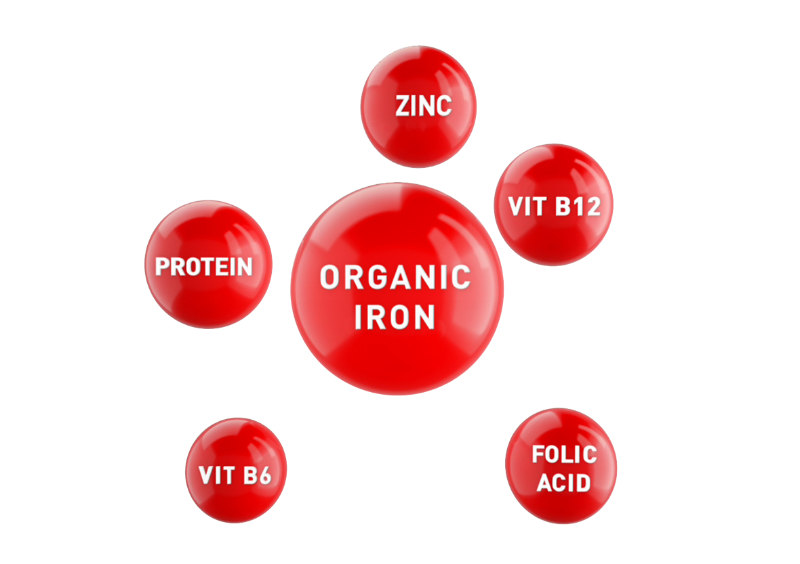The process by which red blood cells are produced in the body is called erythropoiesis. Nutritional deficiencies resulting in a lack of iron, folic acid, vitamin B12, vitamin A or even vitamin C mean erythropoiesis is either less effective or results in the production of red blood cells that don’t function properly. In particular, folic acid, vitamin B12 and iron play crucial roles in erythropoiesis.5
Importance of micronutrients as blood health builders

Micronutrients are dietary components, often referred to as vitamins and minerals.
Which although only required by the body in small amounts, are absolutely vital to development and overall well-being. The human body cannot produce micronutrients itself and so they must be derived from our diets.
Iron is a key component of hemoglobin, the protein which transports oxygen through blood in our bodies. If one doesn’t have enough iron, the body cannot produce enough healthy oxygen-carrying red blood cells.
Folic acid, on the other hand, is a type of B vitamin that aids in the production and repair of DNA, and works closely with vitamin B12 in producing red blood cells and in helping iron to function properly in the body.
Vitamin B12 is also an essential nutrient in the B-complex. It is integral in numerous physiological processes such as red blood cell formation and bone marrow health.
Another micronutrient integral to blood health is vitamin A as it helps support red blood cell development. Vitamin A plays a role in the development of erythroblasts from progenitor stem cells, ensuring that the body can produce enough new red blood cells to replace those that die due to age. It also ensures that the developing red blood cells have access to iron needed for hemoglobin.
Though not regularly mentioned in the family of micronutrients essential to building blood health, Vitamin C supports body’s ability to absorb iron. In individuals with poor dietary intakes of iron Vitamin C is along with the iron rich diet helps to enhance the iron absorption.
Whether you are a developing child, a pregnant woman or otherwise a healthy adult, there is no better time than now to ensure you are getting the essential micronutrients you need to support excellent blood health and to overall help keep you fit and healthy.
The information contained in this article is not intended or designed to diagnose, prevent, treat or provide a cure for any condition or disease, to ascertain the state of your health or be substituted for medical care. P&G encourages you to seek the advice of your doctor or healthcare professional if you have any questions or concerns arising from the information in this article.
REFERENCES:
5 Tremblay, S. "What Nutrients are needed for red blood cell production?" SFGate Healthy Eating website. https://healthyeating.sfgate.com/nutrients-needed-red-blood-cell-production-5131.html